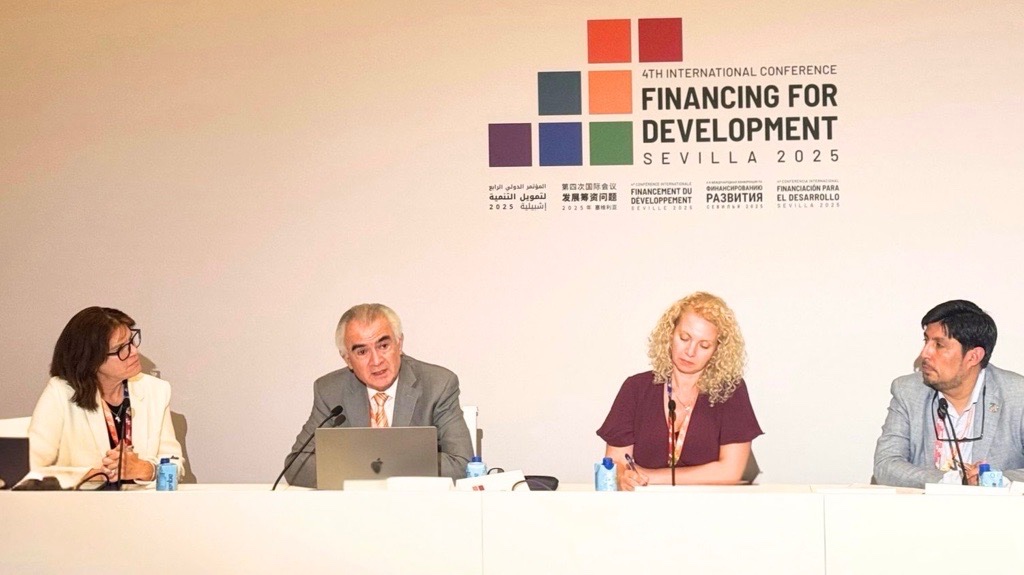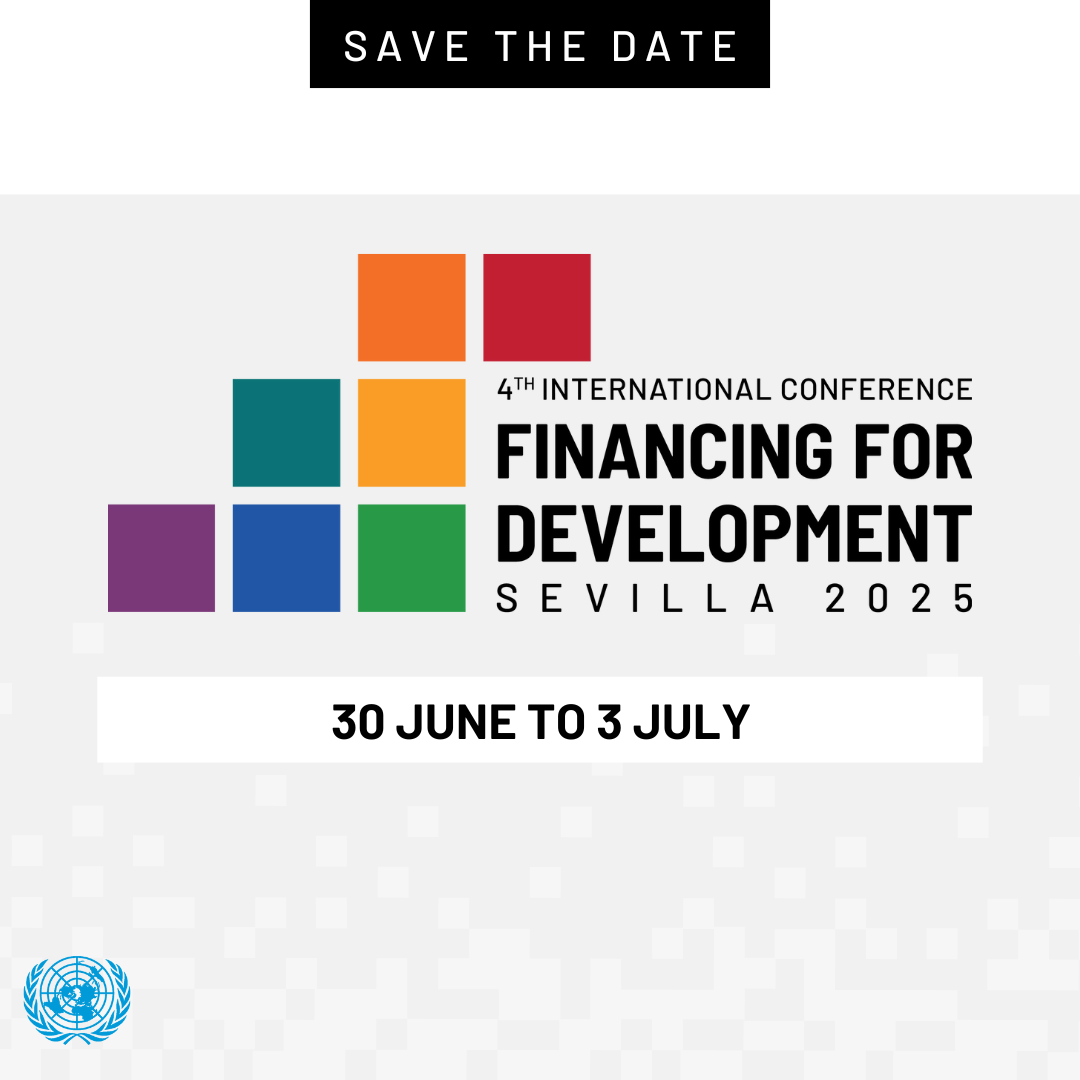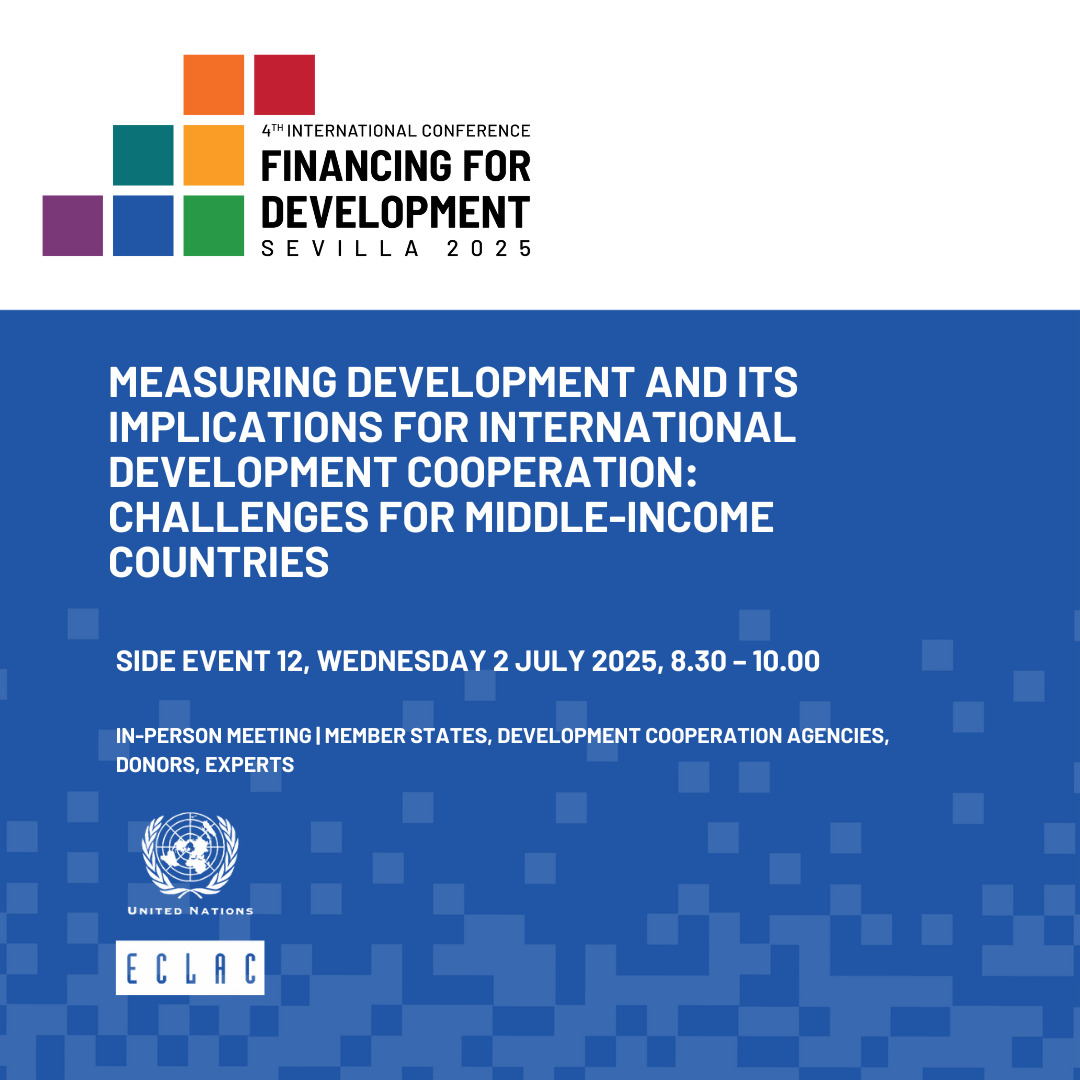Faced with Financing for Development Challenges, Latin American and Caribbean Countries Need to Strengthen their Capacities to Mobilize Resources and Forge Renewed Cooperation Mechanisms
Work area(s)
ECLAC’s delegation, led by Executive Secretary José Manuel Salazar-Xirinachs, actively participated in numerous events at the Fourth International Conference on Financing for Development, which took place this week in Seville, Spain.

The countries of Latin America and the Caribbean, the majority of which are classified as middle-income, face growing challenges that require a reformulation of the criteria and mechanisms that govern the conditions for accessing financing and international development cooperation.
Given the challenges related to financing for development, the region’s countries need to strengthen their capacities to mobilize resources and forge cooperation mechanisms based on metrics that reflect each country’s needs as well as their overall heterogeneity, ECLAC indicated during the Fourth International Conference on Financing for Development (FFD4), which took place on June 30-July 3 in Seville, Spain.
The Economic Commission for Latin America and the Caribbean (ECLAC) participated prominently in various sessions, side events and meetings held at this important global gathering, which drew the attendance of more than 50 international leaders, delegates from 150 countries and 15,000 representatives of all areas of society. At this global forum – convened by the United Nations General Assembly to reform the international financial architecture and accelerate implementation of the 2030 Agenda – ECLAC promoted the region’s voice and commitment in the debates, with concrete proposals for fostering sustainable development with gender equality, tax justice and multilateral cooperation.
ECLAC’s delegation was composed of high-level officials, led by the Commission’s Executive Secretary, José Manuel Salazar-Xirinachs. In their conversations with authorities from national governments, international organizations, experts and representatives of academia and civil society, it was clearly established that this conference, and the resulting “Seville Commitment” approved by governments, attest to the global commitment to forge a renewed framework for development financing.
“Due to their importance in the global economy, middle-income countries (MICs), including those from Latin America and the Caribbean, are central to the implementation of the 2030 Agenda. However, they face significant structural challenges for achieving development, which are related to the three traps identified by ECLAC in which the region is mired: low capacity for growth; high inequality, low social mobility and weak social cohesion; and low institutional capacity and ineffective governance,” Salazar-Xirinachs said during the side event Measuring development and its implications for international development cooperation: Challenges for middle-income countries, which was organized by ECLAC on Wednesday, July 2.
The senior United Nations official added that the exclusive use of Gross Domestic Product (GDP) per capita to guide the allocation of resources limits the efficacy of cooperation for development and restricts countries’ ability to leverage additional resources. It is critical to move towards international cooperation schemes that use more comprehensive indicators capable of capturing the needs and structural diversity of the region’s countries, he asserted.
That same day, ECLAC’s Executive Secretary also spoke at a side event entitled “New Approaches for Renewed International Cooperation: ‘Insights for the Beyond GDP Global Alliance,’” convened by the Government of Spain, the Organisation for Economic Co-operation and Development (OECD), the United Nations Conference on Trade and Development (UNCTAD) and the Ibero-American General Secretariat (SEGIB). There, he recalled the efforts the institution has made to advance a development measurement that goes beyond GDP, which includes the “Development in Transition” framework developed in strategic partnership with the OECD and the European Commission, along with the “Multidimensional Poverty Index of Latin America (MPI-LA),” built in conjunction with the United Nations Development Programme (UNDP).
“We must act together to forge a global consensus on describing development in a broader way. That is why ECLAC supports the international community in forging a ‘Beyond GDP Global Alliance,’” he indicated. “We conceive of this Alliance as being a crucial mechanism for putting into practice the commitments of the Pact for the Future (adopted by the United Nations in September 2024),” he added.
Meanwhile, at the event entitled “The role of Regional Commissions in supporting member States in the follow-up to the outcomes of FfD4” – organized by the United Nations Regional Commissions on Thursday, July 3 – the Officer-in-Charge of ECLAC’s Economic Development Division, Noel Pérez, spoke on behalf of José Manuel Salazar-Xirinachs to provide an overview of ECLAC’s perspective regarding financing for development in Latin America and the Caribbean and follow-up to the outcomes of the Seville conference.
“As we approach 2030, Latin America and the Caribbean finds itself at a critical crossroads and faces profound challenges for mobilizing the resources needed to achieve the SDGs and support inclusive, resilient and sustainable development. The shortage of financing for development is enormous in our region, since Latin America and the Caribbean faces a regional financing gap of approximately $650 billion dollars a year,” the ECLAC official indicated.
Regarding the future of financing for development, he added that the role of the UN Regional Commissions is more crucial than ever since they are in a unique position to support their member States in implementing and monitoring the outcomes of the FFD4 conference. “The regional commissions play a fundamental role in promoting reforms of the international financial architecture. By articulating regional perspectives and priorities, we can contribute to shaping the global debates and ensuring that the voices of our member States are heard in international forums,” he emphasized.
Separately, on Tuesday, July 1, ECLAC’s Executive Secretary participated in the “Multi-stakeholder Forum on the Bi-regional Pact for Care between Latin America and the Caribbean and the European Union,” organized by the European Union-Latin America and the Caribbean (EU-LAC) Foundation, UN Women and ECLAC. In his remarks, he underscored that care must be at the center of the solutions to development challenges, and he recognized the Colombian government’s leadership in moving towards a bi-regional pact that can be endorsed at the next CELAC-EU Summit of Heads of State, scheduled for November in the city of Santa Marta. “The Bi-regional Pact seeks to formalize and deepen collaboration between the countries of Latin America and the Caribbean and the European Union on the matter of care, based on shared values and marking a transformative path of mutual learning,” he sustained.
In addition, that same day he participated in the event “Call to Action: Strengthening Capacities for Financing for Development,” convened by the OECD, the Ministry of Foreign Affairs and International Cooperation of Italy, the State Department for Economic Planning of Kenya, the Ministry of Planning and Economic Development of Egypt, and the Spanish Agency for International Development Cooperation (AECID). There, he stressed the importance of institutional capabilities for driving the vital transformations that Latin America and the Caribbean needs. “Public sector capacities in the fiscal area are key. That is why we at ECLAC firmly and enthusiastically support the Call to Action for expanding and coordinating technical cooperation and strengthening countries’ institutional capabilities in the fiscal arena,” he indicated.
Furthermore, also on July 1, he spoke during the “Investing in Data, Advancing Development” session, coordinated by the National Administrative Department of Statistics (DANE) of Colombia. “The experience of the 2030 Agenda teaches us that data is not only useful for monitoring but also for catalyzing structural change. Going forward, artificial intelligence, big data and digitalization can be powerful allies. Investing in data is not an option: it is the foundation on which we will build the just, sustainable and resilient development that Latin America and the Caribbean deserves,” he said on that occasion.
Meanwhile, on Monday, June 30, José Manuel Salazar-Xirinachs participated in a side event entitled “Visions for Development: Seville 2025” – convened by ECLAC, the OECD Development Centre and the CAF-Development Bank of Latin America – where the joint ECLAC-OECD-CAF report Latin American Economic Outlook 2024: Financing Sustainable Development (known as LEO) was presented. “How can we mobilize the resources we need to achieve productive, inclusive and sustainable development? Strong technical, operational, political and prospective (TOPP) capabilities are needed to design and implement policies for resource mobilization and to improve the efficiency of public spending,” he indicated at that gathering.
For a full list of the meetings and side events in which ECLAC participated at the Fourth International Conference on Financing for Development, see this news item.
As the global conference came to a close, ECLAC reiterated that it has the capacity and commitment to support the region’s countries in formulating and implementing development financing policies that would strengthen the ability to mobilize resources and promote more effective international cooperation, based on indicators that reflect the real needs and heterogeneity of Latin America and the Caribbean, with the aim of building a productive, inclusive and sustainable future.
Related content

ECLAC Will Promote Latin America and the Caribbean’s Voice and Commitment at the Fourth International Conference on Financing for Development
The United Nations regional organization will participate actively in the global conference, where it will emphasize the financing challenges faced by the region and the urgent need to…

FFD4 Side event - Measuring development and its implications for international development cooperation: Challenges for middle-income countries
Building upon the experience of recently graduated Member States in Latin America and the Caribbean, this side event contributes to the global debate on measuring development and its impact on…
Related link(s)
Country(ies)
- Latin America and the Caribbean
Contact
Public Information Unit
- prensa@cepal.org
- (56 2) 2210 2040